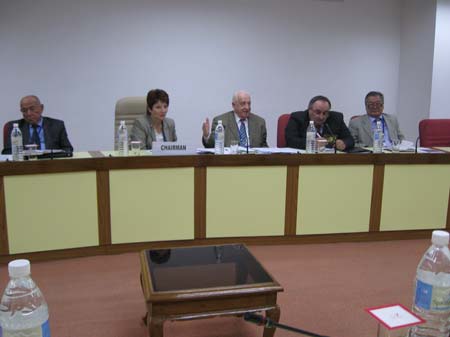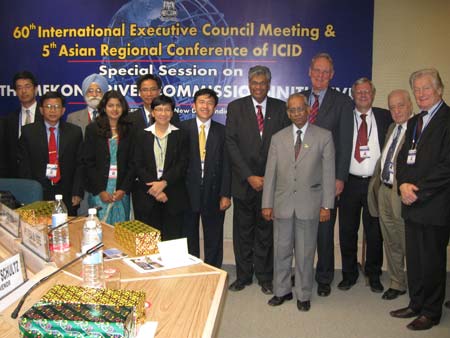PARTICIPATION OF ICWC DELEGATION AT THE 5 ICID CONFERENCE AND 60 MEETING OF THE EXECUTIVE COUNCIL OF ICID
(Finishing; the beginning is in the previous issue)
The ICWC delegation's members have acted as main organizers of ICID Special session on the Aral Sea Basin "Water and Food Security in Central Asia". President Chandra A. Madramootoo emphasized the great importance of the Aral Region as one of the key regions in the World where methods and approaches to solve the complex water and food security problems related to transboundary rivers and the increased stress related to climate change and social problems were tried out. Here the cooperation scenarios between not only the water management organizations but at the inter-sectors level to overcome competition especially between irrigation, power engineering and ecology also are tried out.

In the opening speech and the key presentation "Water and food security in the region" Prof. Dukhovny V.A. had emphasized the role of political wills of the region's countries on the cooperation development and had noted importance of the meeting of the states' heads of 28 April 2009 in Almaty for further strengthening of cooperation on transboundary waters. Having shown the water availability during dry year 2008 and all course of mutual relation, he has presented a complex of measures, which should be undertaken within the framework of region's countries interaction for overcoming certain hydro-egoism aspirations. It is needed, firstly, to complete the signing of the Agreement on the Syrdarya river, to develop the methodical approaches on assessment and payment for damages caused by break of agreed water distribution modes and plans, as well as to develop the legal base of cooperation within IFAS on the basis of statutory provisions of the International Water law. It is very important all countries have to be acceded to both Conventions (1992 and 19979) and thereby to demonstrate their adherence to support the UN line of water security ensuring.
The reporters of the region's countries mainly have followed this line of behavior. Mr. Beisebekov P., representative of Kazakhstan, had demonstrated projects on development of Kazakhstan, on restoration of Northern Aral Sea and Syrdarya delta, on the natural and ecological potential of "deep places" in the region. He stated that "these projects in the Aral Sea Basin and their objects have to become as "spots" of the progress on the integrated solution of the water management problems and dissemination of modern innovation experience in the rehabilitation of the natural water bodies and irrigated lands, novel reconstruction methods, organization of quality operation of irrigation and drainage systems and efficient water use".
Mr. Beishekeev K., representative of Kyrgyzstan, had noted the great progress achieved by the republic in creation and development of WUAs, in restructuring of water sector, stabilizing and reducing water intake from all water sources. Having emphasized the role of hydropower development for satisfying the fuel and power needs of the republic, he stated that "construction of Kambaratinsky HES-1 and HES-2 will allow to satisfy not only the energy needs in the republic but also possibility to the Toktogulsky waterworks operation in the irrigation regime for the our neighbors' benefits."
Mr. Khasanov Kh., Deputy Minister of water resources management of Tajikistan, demonstrated the role and importance of water management improvement for the republic as the key sector of its development and progress. “Scientifically grounded and ecologically acceptable level of total water use is determined in volume of 80 km3 per year. Do we want or not, this is a limit determined by the nature. And we have to learn how to follow it even if we need great efforts to do this. Experience of countries, which obtain up to 4 tons/ha using 5000 m3/ha in the similar natural and climatic conditions, indicates the great potential of water saving.
According to above-mentioned it is supposed that implementation of the water saving ideology as a base of regional water strategy and all actions on further water resources development and management requires a large preparatory work. Parameters and factors of each planning zone, which consists of river's reach and permissible area of irrigated land inside the country, and then within a whole country in the basin have to be determined, analyzed and evaluated."
"The special task is to analyze the water losses caused by organizational mistakes such as wrong water distribution because of insufficient information. These water losses numbering billions m3 have to be discovered and mechanism to avoid and prevent it has to be elaborated by regional and international experts jointly.
Because this problem is international the market relations between countries - water users have to be based on the international water law. As to the transboundary watercourses use it means that any water overuse must be compensated. Saving water use is more beneficial for water user than expensive water delivery.
Recently a lot of debates and negotiations on water and energy problems are being carried out between Central Asian countries. One has the impression that this process is supported with certain aim by some interested stakeholders. Particularly it is asserted that implementation of water-power projects in Tajikistan will damage the neighboring countries. In connection with this I would like to note that such statements are completely baseless. Construction of water-power structures in Tajikistan does not lead by no means to water decrease of transboundary rivers in the region and to deterioration of ecological situation.
Today it is needed to draw attention on such thing that we must not prolong people's suffering which is lasting for last 17 years in the winter. I appeal to those representatives of fraternal peoples of Central Asia who are here, and I would like to stress clearly and precisely that the people of Tajikistan is one of the ancient people of this territory and lived with its neighbors for many centuries peacefully and in friendly air. Having continued the heart-warming tradition we never leave our neighbors without water. We always will fulfill the commandments of our great parents from the Hadis of great Islamic prophet: "The service for neighbor is the service for the Most High".
Mr. Ernazarov N.Sh., Vice-chief of the main water management administration of the Ministry of Agriculture and Water Resources Management of Uzbekistan, have spoken about water management principles in the Republic, about the role of water management for well-being of rural people and for the whole country, about development of the State Program on coordinated improvement of irrigated lands, ensuring the ecological and food security. Uzbekistan now has reached close to the self-provision with food under water deficiency of 20% annually from the agreed water limit of transboundary rivers.
Referring to the speech of the President of the Republic at the council meeting of supreme leaders in Bishkek, 16 August 2007, he stated approaches of Uzbekistan, which are as followings:
- Problems on use of transboundary water resources of Central Asian rivers have to be solved in consideration of interests of more than 50 million people living in all countries of the region;
- Any actions implemented on the transboundary rivers must not negatively affect the existing ecological and water balance of the region;
- The active international legal base on water use and ecology, particularly "UN Convention on the Protection and Use of Transboundary Watercourses and International Lakes, 1992”, and "UN Convention on the Law of the Non-navigational Uses of. International Watercourses", 1997 have to become the basis for development of the efficient system on the transboundary water resources sharing in Central Asia.
- There have to be guarantees that damages from regional country when the hydraulic engineering structures are under construction stage on the transboundary watercourses have to be excluded, and construction of structures will not lead to the negative ecological consequences and will not disturb the existing balance of all countries-waterusers along the river;
- The projects on water resources use of transboundary rivers including the hydraulic engineering construction have to be implemented after preliminary comprehensive independent expertise under transparency principle and full information awareness of stakeholders;
The projects have to be implemented on the basis of constructive approach and compromise in consideration of the other states' interests and the following very important conditions are ensured:
- water level has not to be decreased for downstream countries;
- ecological security of the region has not to be deteriorated.
Representatives of various countries - ICID's members including Prof. Dr. Bart Schultz, Honorary president, some vice-presidents, the heads of national committees on irrigation and drainage from European countries had noted that Central Asia has advanced far on development of its approaches for impact assessment on transboundary waters and on implementation of IWRM The line undertaken by countries to involve waterusers and to increase water and land productivity and optimizing the irrigated lands use and improvement of organizational forms attracts attention of European water communities and activates their intention to participate in this process. In particular, the IHE-UNESCO institute represented by Prof. Dr. Bart Schultz, has developed the training program for joint work with ICWC, which will be implemented in 2010-2012; the collaborative project on modelling the future development of water resources management in the region and in each of countries etc. President Chandra Madramootoo had expressed confidence that ICID's authority and himself will do all efforts to attract further the financial resources for the collaborative work with ICWC's members and its working bodies.

At the end of meeting, the Vice-President I.P.Kovalenko had presented materials grounded activity and the work program of new working group "Irrigation and Drainage in States under Social-Economic Transformation ".
Prof. V.A.Dukhovny took part in the "Water Governance" session organized by Mr. M.Svendsen, the chairman of USCID. He presented the report, which was prepared jointly with Mrs. D. Ziganshina for the special working group at the General Assembly of the World Water Council. This report, as the Central Asia case study, is dedicated to the problem on further increasing of crisis of international management of transboundary waters if the world water community will not mobilize efforts to overcome "the water-power egoism”. The outcome of water governance system has to be the legal base, which is ensuring the water right protection for all people in a sustainable manner. The water authority has to be considered as the base for decision-making on all problems (operational management, regimes' control, quality control, water development et.) for decision-makers and management system at all levels of water hierarchy. The proposed measures were approved during the debate and Mr. Svendsen (the working group manager) and Mr. Wolf were authorized to elaborate the ICID position on this problem in order to advocate interests of irrigated agriculture and ecology.
Despite of positive influence of participation of ICWC delegation in the conference it is a shame that the young professionals from our region are not yet involved in the ICID working groups because they are the base of future international relationships development between the region and the world community Probably the ICWC members do not understand the importance of such events for development of knowledge about the world experience as well as for demonstration of our professionals' potential.
|